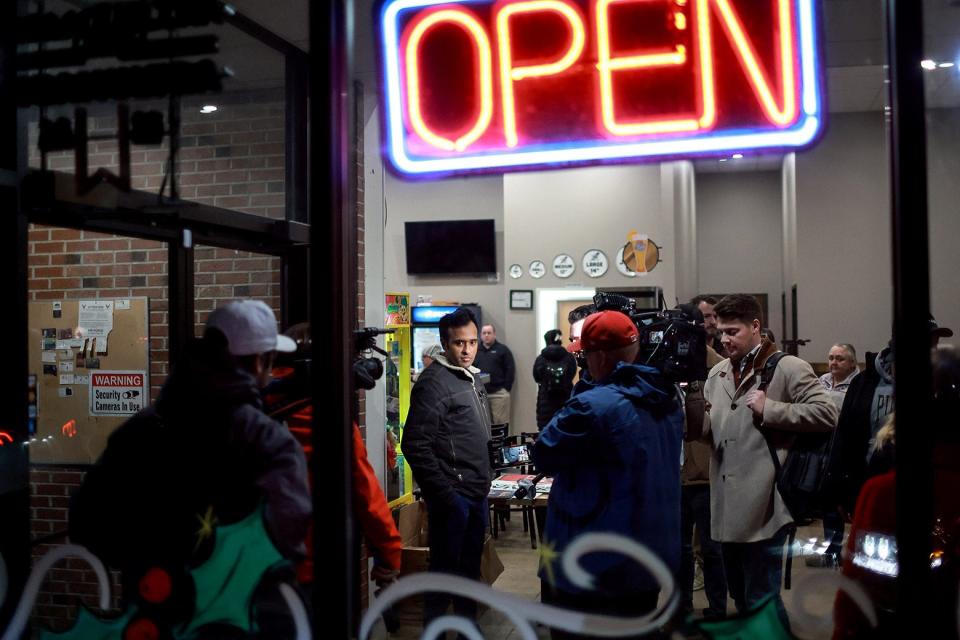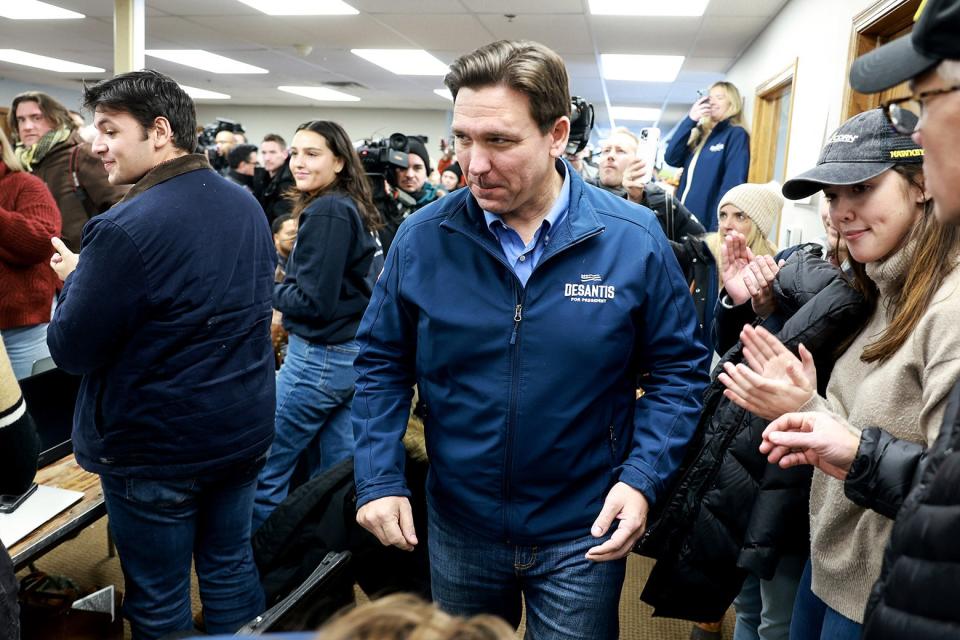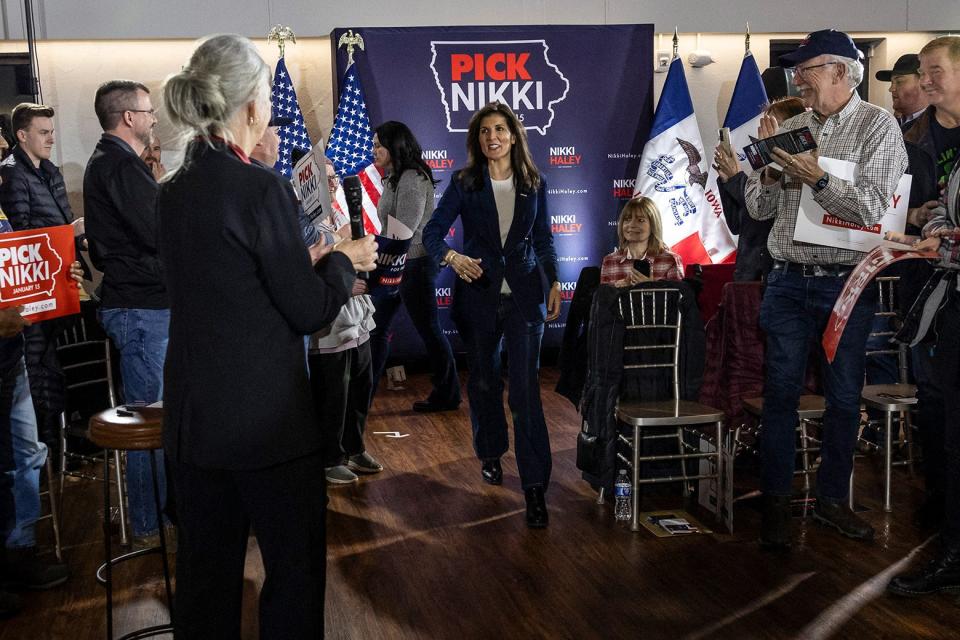How the Iowa Caucuses Fell Apart
The scene on a cool Sunday morning in Osceola, Iowa, could have been out of a movie about the Iowa caucuses. Roughly 40 people had gathered in a narrow storefront on the otherwise empty town square. The wind was brisk, the sky was the color of faded whitewashed paint, and the only activity around town was a freight train rumbling by. Inside the room, which was jammed with folding tables, attendees sat with tall travel mugs and patiently waited for a candidate who had been darting around Iowa at a frantic pace: Vivek Ramaswamy.
It was an event like thousands of others in the half century since the Hawkeye State stumbled into its first-in-the-nation role during presidential primaries. There was a local politician touting his support for Ramaswamy and explaining that this long shot did actually have a path to victory, despite all signs to the contrary. Being a Republican event, there was a prayer. Being Iowa, the officiant made sure to give thanks to the Almighty for “letting us live in Iowa, where we have caucuses and first-in-the-nation status.” And being a political event, the candidate was late. The typical advantages of starting early in the morning were canceled out by an uncooperative campaign bus.
Once he got there, the rhetoric was standard Ramaswamy. He flattered Iowa crowds for being particularly astute and letting him get into policy details at campaign events. He suggested that the nature of the Iowa caucuses meant that Big Tech couldn’t try to interfere with the results, and that allowed candidates like him to have a chance. “There are no social media algorithms distorting what you’re thinking in this room,” Ramaswamy said, beaming.
Juiced by occasional rounds of applause instigated by a staffer sitting in the back of the room, Ramaswamy introduced his wife, took questions from the audience, and gave his spiel about why he is the natural successor to Donald Trump: a candidate willing to go even further than the former president for the populist, isolationist right but a youthful voice who can inspire a “revolution” in American politics. It was his version of the delicate dance that all Republican candidates have had to undertake in a race where Trump is not merely the front-runner but the de facto incumbent and leader of the party. After all, trailing candidates are supposed to attack a front-runner, but it is taboo to challenge an incumbent.
Yet, as typical as this scene felt, it also felt like a political anachronism. Although the Iowa caucuses are still a local contest, the wildly polarized news environment and an increasingly homogenized political system have flattened it. It’s not just the looming presence of Donald Trump as the first former incumbent to mount a comeback bid in the modern era but also the sense that the very nature of American politics has changed—at least for now.
Because for as much as Iowans still treasure their long history of boosting underdogs into winning victories, a Jimmy Carter or a Rick Santorum couldn’t come out of Iowa successful in the modern era. It’s an age when the endorsements of online influencers or podcasters carry as much weight as those of local elected officials and political viability is assessed as much by the arbitrary thresholds used to determine the stage for televised debates as by grassroots organizing. The frenzied on-the-ground politicking of the past has given way, increasingly, to 30-second campaign ads and cable news hits.
The result is a politics that has become increasingly generic. Pet local issues have faded from the stump speech—after all, Fox News does a lot more segments about trans athletes in high school sports than ethanol.
It’s not that the candidates haven’t been putting in work.
Ramaswamy’s race around the state has meant, at times, clocking half a dozen appearances a day. Nikki Haley is working the crowds that come out to see her, telling people to ignore the polls and media—but also, by the way, did you see the Wall Street Journal poll from the end of last year that showed her beating Biden by 17 points in a hypothetical matchup? In early December, Ron DeSantis completed a “full Grassley,” the local term for the significant undertaking that is visiting every one of Iowa’s 99 counties.

This is a ritual that politicians have long performed to demonstrate their seriousness about competing not only in the state’s more populous areas but in its rural parts, which include vast, sparsely populated tracts far from commercial airports. It’s easy to fly into Des Moines or Cedar Rapids, but showing up in Adams County or Palo Alto County requires real effort. Traditionally, this wasn’t just an effective tactic to woo rural voters—it was a message as well, an effort to convince caucusgoers that a candidate deserves their support because he is campaigning for it the right way, the Iowa way.
A candidate not doing that is Donald Trump. He won’t make it to even 20 counties by caucus night. In November, Trump held a raucous rally in a high school gymnasium in Fort Dodge, a fading factory town 90 miles northwest of Des Moines. It was an event where he did absolutely everything one is advised not to do as a politician here. He denigrated local elected officials, saying he was responsible for the 2022 reelection of Chuck Grassley, the state’s nonagenarian senator, who began his undefeated electoral streak in the state during the Eisenhower administration. Trump also took credit for the victories of the state’s other senator, Joni Ernst, as well as the governor, Kim Reynolds, whom he spoke of with scorn because of her support for DeSantis.
He was casual even about the need to attempt to campaign in Iowa. As Trump riffed on the podium—about, in this case, his desire to reoccupy Bagram Airfield in Afghanistan and his insistence that the audience watch the 1962 thriller The Manchurian Candidate—the former president casually mentioned that he’d “be back four or five times, maybe six times before the election,” in a state where Ramaswamy had rented an apartment for the home stretch.
Trump’s reward? A lead of 51 percent to 19 percent over DeSantis, his closest competitor in the benchmark Des Moines Register poll of the state in early December. It was the largest lead recorded in the poll’s history for any competitive Iowa caucus.
Yet, despite Trump’s substantial lead, the campaign for second continued unabated. For $25 a ticket, Bob Vander Plaats, a top evangelical activist in the state, welcomed voters to the 2023 Thanksgiving Family Forum, a conservative confab held on a Friday evening in Des Moines. The event boasted Haley and DeSantis together—with Ramaswamy a bonus.
A stage in an overheated ballroom was set up for the event, like some bizarre mix of a family Thanksgiving dinner and the set of the old television show Hee Haw. There were hay bales stacked alongside pumpkins and gourds. The candidates sat at a dining room table that featured a large cornucopia and a Bible. Vander Plaats presided at the head of the table, moderating a “family discussion,” pitched as a sort of reprieve from the antagonism of the primary debates. The evangelical leader had made clear that opposition to abortion was the single most important factor in his decision about whom to endorse. All three candidates discussed their disapproval of abortion in sharply personal terms, referencing the difficulty they experienced as families trying to get pregnant.
The event seemed almost tailored for DeSantis, who has tried to position himself as the most socially conservative candidate. Vander Plaats has long been a skeptic of Trump, and among Iowa operatives, it had been taken for granted he would endorse DeSantis. (He did so days later.) Still, both DeSantis and Ramaswamy invested in hospitality suites for attendees and had their pitches ready to woo a crowd of fervent evangelicals they hoped were not wedded to Trump. Haley, who has focused more on New Hampshire, seemed to be there more to check boxes than to win hearts. The South Carolina governor’s path to victory didn’t require her to be beloved by the attendees—just to win enough of them over as a second choice if DeSantis’ collapse continued in the polls.
Vander Plaats is a longtime Iowa power broker who has commanded a strong base of support among evangelical voters in the state. He led the successful 2010 effort to oust the Iowa Supreme Court justices who ruled that Iowa’s ban on same-sex marriage violated the state constitution. He has endorsed the three most recent Republicans who have gone on to win contested Iowa caucuses. But his endorsement of DeSantis this year, when it finally came, didn’t move the needle one bit.

DeSantis distinguished himself early in the primary—indeed, before he was even officially in it—with his dogged appeal to evangelical voters as a candidate who wholeheartedly shares their values on social issues. Trump lost Iowa in 2016 to Ted Cruz in part because of skepticism from many social conservatives that the thrice-married New Yorker could be trusted on issues like abortion in office. The Florida governor has tried to reopen this wedge on the campaign trail by talking about putting on “the full armor of God” and emphasizing his sincerity in fighting “leftism” and pursuing an anti-“woke” agenda.
And the Florida governor did start 2023 as a seeming juggernaut. Fresh off a landslide victory for reelection and receiving rapturous coverage from conservative media, DeSantis appeared within striking distance of Trump in polls. He built a bifurcated political operation that invested in doing everything right. It wasn’t just that he visited all 99 counties but that he built up a strong field operation and rolled out an impressive roster of local endorsements.
It was an operation that did everything according to the long-established rules but did very little to recognize how much the underlying game had changed. The elevator pitch for DeSantis’ campaign—that he would be like Trump, only more competent and far more sincere as a social conservative—moved few. Instead, his campaign has stumbled. He has struggled to connect with voters on the trail and has dealt with internal turmoil that led top aides to step away.
DeSantis has done his best to try to fight back against the narrative of a declining campaign. On a separate day, in a small, overcrowded office in suburban Des Moines, he tried to project an air of strength. The room was roughly a third Iowans, a third journalists, and a third DeSantis staffers. It felt disjointed: A prayer was immediately followed by Poison’s “Nothing but a Good Time” blasting through the confined space. DeSantis’ brief remarks were a mix of clichés and jabs at Trump, who remained unnamed. DeSantis stood in front of a bus with Reynolds, the governor, who had recently endorsed him, and engaged in a long-standing tradition for candidates sliding in the polls: He took questions from television network embeds about why he was losing and gave answers about why, contrary to the polls, he would still win.
It’s hard to determine whether this lack of Iowan élan vital is because Trump is the front-runner or if Trump is the front-runner because of the lack of élan vital. The two are dependent variables. Trump’s rise and continuation as the Republican front-runner after one coup attempt and 91 criminal charges (over several indictments) have undoubtedly contributed to a nationalized environment where candidates’ doing traditional retail politics matters far less than it did before. Then again, if traditional retail politics still mattered, Trump wouldn’t be poised to become the nominee. He might never even have become the Republican nominee in the first place in 2016.
The model for how retail politics can shape a presidential campaign was Rick Santorum’s 2012 run for the Republican nomination. Despite being an afterthought in the polls for most of the year, the former Pennsylvania senator relentlessly went from town to town in Iowa, making campaign stop after campaign stop. The result was that he won the Iowa caucuses—albeit only after three weeks of a muddled count—and came close to besting the far-better-funded Mitt Romney for the GOP nomination.
Santorum, who has remained neutral in 2024, told Slate he was unsure if that kind of low-budget campaign could be successful against a former president. Besides, “it’s harder to go out there and anonymously be in the vineyards and have the national media not pay any attention to you,” he said.
“If you’re not gaining presence on social media, if you’re not driving any kind of attention there, then you’re probably not going to get much grassroots support in Iowa because caucusgoers pay attention to what goes on on social media,” Santorum added. Still, he said, he thought there would always “be demand for grassroots politics, particularly in a state like Iowa,” and predicted that eventually the pendulum would swing back to a more traditional form of campaigning.

Nikki Haley has been running a different kind of traditional campaign, presenting herself as the candidate of the GOP establishment. Republican caucusgoers in the Hawkeye State have long had a pronounced bent toward social conservatives, which makes the state tough political terrain for those candidates running from the Chamber of Commerce wing of the party. But those candidates still play in the state in order to do enough to meet the expectations of pundits and media and maybe eke out a surprise as well.
Fitting this mold, Haley’s events have had a polished feel to them. Speaking on a crisp Friday morning at a lodge of an Italian-American fraternal group in the Des Moines suburbs, she addressed a packed room of mostly older voters arranged around her in a half-moon. She gave a precisely scripted stump speech and stayed on message as she took questions afterward in sound bites so concise that they could have been given in debates. Nobody could accuse her of not staying on message.
Even attempts to needle her were brushed aside. Fortune cookies with the message “Nikki Haley hearts China” had been distributed around the event in a pro-DeSantis attempt to paint the former South Carolina governor as overly sympathetic to the CCP regime. But not a single voter saw them.
Yet, while it was polished, it was also paint-by-the-number. There was no underlying ideological urgency or even strong policy specifics to what Haley was offering. Instead, it simply felt like an aspiration to be “generic Republican” without a strong contrast to other candidates. It is rhetoric that is the political equivalent of eating celery. It certainly doesn’t seem unhealthy to consume, but it just doesn’t provide much nourishment.
There will always be regional differences between states, and a caucus in Iowa will always be inherently different than if it were held in Idaho or Indiana. Every state has a unique demographic mix and a different economic base. But a state’s politics should be more than its particular percentage of college-educated white voters or weekly churchgoers or any other host of statistics laid out in an Excel spreadsheet.
It’s not that candidates are no longer showing up in small town squares or trying to persuade local bigwigs to rally behind them. They can still be seen flipping pork chops at the state fair or pretending to support Iowa or Iowa State sports. There is still movement in the polls; in some, Haley has overtaken DeSantis as a distant second to Trump in Iowa, for example, but only after national momentum appeared to coalesce around her as the long-shot alternative candidate.
But it all seems more homogenized and, as a result, less meaningful and less vital than the last Republican contest did even eight years ago, when voters here relegated Trump to second place behind Ted Cruz. In other words, Iowa increasingly seems less like a proving ground for candidates. Instead, it’s more like a sprawling studio where candidates can perform for cable news.

